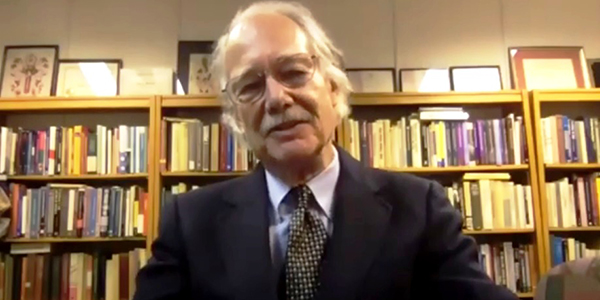Popular political science professor virtually returns to Binghamton

“The years have not changed your ability to provoke us to think about the world in a way that challenges us to keep asking better questions,” Owen Pell ’80 said to his longtime friend and former instructor Edward Weisband.
Pell’s was one of many profound thoughts shared Nov. 12, during the virtual “Nationalism, Collective Identity and the Election” event sponsored by the Binghamton University Alumni Association. Weisband, distinguished teaching professor emeritus of political science at Binghamton University, held a conversation with nearly 125 alumni about world and national politics, the economy and constructions of identity.
He took questions delivered by two co-moderators who are his former students: Jami Floyd ’86, host of “All Things Considered” on WNYC radio in New York, and Jessica Goldfarb ’86, chief operating officer of Resilience Lab.
Weisband discussed the political and economic climate in 1972 ― the year he arrived at Binghamton ― when President Richard M. Nixon had taken the American dollar off the fixed rate exchange system, removing the currency from its function as a basic standard.
“If you think about democracy, global governance and world order, we’re living in an era, 50 years approximately since the Nixon shock,” said Weisband, the Edward S. Diggs Endowed Chair in the Social Sciences and professor of political science at Virginia Tech. “That 50 years taught us many lessons, including the dangers of currency manipulation without a fixed rate system.”
Weisband said 1972 is also important because it represents the start of a half century during which China has risen dramatically in global status, noting that the Communist nation would be the first non-democratic hegemon.
“We’ve had two previous hegemons: Britain before the first World War, and the United States following the second one,” Weisband said. “What allowed Britain to play the role of hegemon in its era was the Bank of England and the British pound sterling…[We will] witness the Chinese currency as the numeraire.”
Pell, incoming chair of the Binghamton University Foundation Board of Directors, provided remarks at the outset and conclusion of the event that spoke to Weisband’s continuing influence on his professional and intellectual life.
“The lessons I learned in Political Science 117 are lessons that influenced my work as a lawyer and even more as president of the Auschwitz Institute,” Pell said. “Few days go by without thinking about some lesson or some way of parsing a problem that I learned from Professor Weisband.”
“I will never forget the beautiful days we spent together, working, thinking, praying, examining, laughing and crying,” Weisband said to the audience. “It has been a while since we’ve been together, but I know your names, and [still] have many of your papers.”
